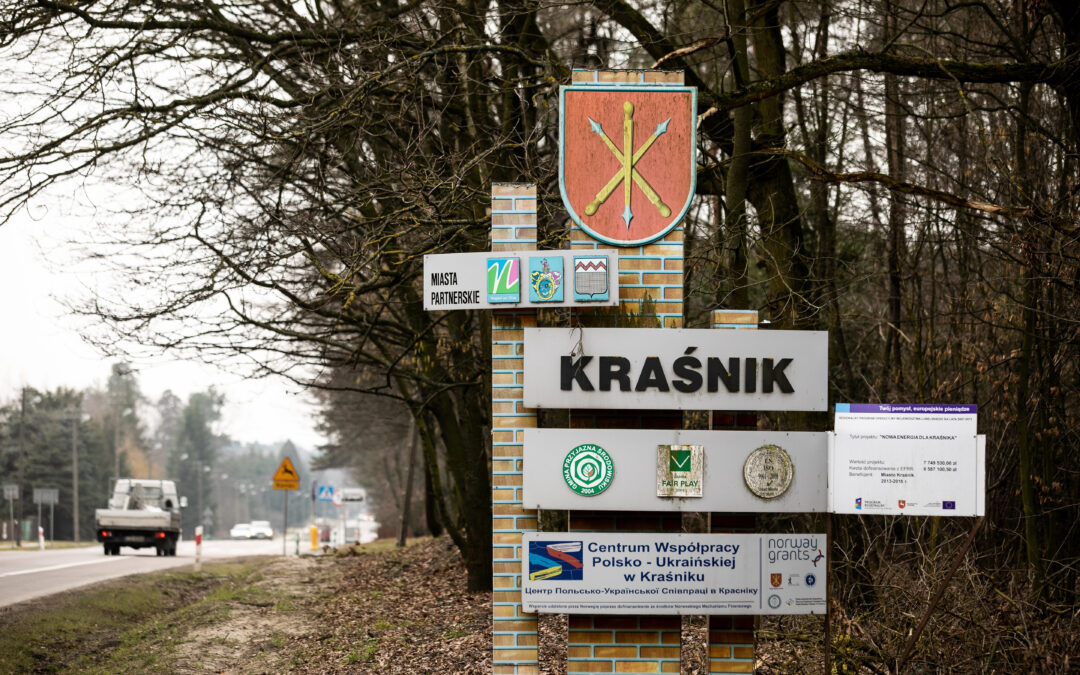A Polish town has voted to keep its declaration of being “free from LGBT ideology”, despite the risk that it could result in millions of euros of lost European grants. At the same meeting, the town council also voted in favour of a proposed ban on 5G technology and Wi-Fi internet in schools.
Kraśnik, a town of 36,000 in the east of Poland, has moved to the centre of an increasingly international dispute over the large number of Polish local authorities that have adopted anti-LGBT resolutions.
Some have been denied funds from the EU’s town-twinning programme, and have also seen partner communities in western countries break off relations. In February, Kraśnik’s French twin town of Nogent-sur-Oise declared that it was suspending cooperation.
In response, Poland’s justice minister last month stepped in to provide one district that had lost EU funding with a cheque for three times more than the amount it had been denied.
Last week, the Norwegian foreign minister, Ine Eriksen, announced that local authorities in Poland that have passed anti-LGBT resolutions will not receive money from the grants that her country provides to support civil society, the justice system, social inclusion, innovation and other causes.
Poland is the largest recipient of the so-called Norway Grants, and is budgeted to receive €411.5 million during the current 2014-2021 funding period (plus a further €397.8 million from the related EEA Grants, to which Norway main contributor).
In her statement, Eriksen specifically mentioned Kraśnik as a community that could see its funding suspended. It could lose an estimated €3-10 million, according to Polish media.
By July, some in Kraśnik’s municipal authorities were already considering withdrawing their anti-LGBT resolution. Passed in May last year, it declared the town “free from LGBT ideology” and promised to combat “homopropaganda” and the “sexualisation of children”.
“If it were to have an impact on the funds we were hoping to invest in developing the town, it would make our functioning very difficult,” said the head of the town council, Dorota Posyniak.
This week, the council held a vote on a proposal to overturn the resolution. However, by an 11-to-9 majority the members chose to stick with it, reports Gazeta.pl.
Among those who voted to keep the resolution were representatives of Poland’s ruling Law and Justice (PiS) party, which has led a vocal anti-LGBT campaign since early last year.
One PiS councillor, Jerzy Misiak, warned that “we cannot allow Kraśnik to become a Catholic wilderness with rampant LGBT ideology”, echoing recent words by party leader Jarosław Kaczyński in reference to what he claims Ireland has become.
At the same session, the council also voted in favour of accepting a petition from the Poland Free From 5G Coalition, an association that campaigns to “protect Poland from the implementation of untested next-generation 5G” technology.
The petition, which is one of many the association has proposed to local authorities, warns that the “exposure to artificial electromagnetic fields” caused by 5G is a “threat to life and health”. It calls on communities to stop the implementation of 5G networks until the effects are fully investigated, reports TVN24.
The document also proposes the “dismantling of existing Wi-Fi networks in schools” and for pupils to be required to put their mobile phones in airplane mode during lessons. Local authorities should also “conduct information campaigns for residents on the health risks associated with electromagnetic fields”.
At the council meeting, the petitioners’ position was presented by a representative of the “Right to Life National Association for the Prevention of Electro-threats”. Nine council members voted in favour of the petition, six against, and three abstained.
Jan Albiniak, the councilman who last year submitted the anti-LGBT resolution, was one of those who voted for the petition. “This is something absolutely new and we do not know how it will affect our bodies and our children,” he said, quoted by local news portal Nasze Miasto.
Like many countries, Poland has seen the development of a movement opposed to the introduction of 5G mobile technology, despite experts making clear it is perfectly safe and debunking the claims and conspiracy theories surrounding it.
Such voices have become particularly prominent during the coronavirus pandemic, with anti-5G groups a visible presence at protests against lockdown measures.
In May, shortly after the rollout of Poland’s first commercial 5G network, a tellecommunications mast in the city of Łódź was set on fire. The mobile operator that owns it warned that cases of vandalism are rising, and are encouraged by misinformation about 5G online.
Main image credit: Jakub Orzechowski / Agencja Gazeta

Daniel Tilles is editor-in-chief of Notes from Poland. He has written on Polish affairs for a wide range of publications, including Foreign Policy, POLITICO Europe, EUobserver and Dziennik Gazeta Prawna.




















